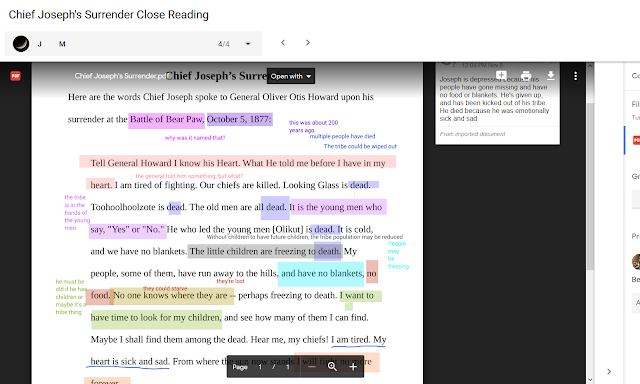Manifest Destiny: An "American" ideal?
 |
| American Progress, by John Gast (1872), created for a travel guide. (The cover of the volume in her arm reads, "Schoo[obscured] book." She's a teacher.) |
Contrary to what some people may say, Manifest Destiny was not widely accepted in America. It found support in the Democrat Party -- Democrat presidents Andrew Jackson and Martin Van Buren (Indian Removal) and James K. Polk (the Mexican-American War) put Manifest Destiny into practice -- but there was "bitter dissent within the national polity." Abraham Lincoln, Ulysses S. Grant, John Quincy Adams, and most Whigs were against imposing our civilization onto other lands and peoples; instead, they believed that America should lead by example. (The Whigs were popular enough to produce two presidents before and two after Van Buren.)
This latter view is consistent with the Founding Fathers' perspective on Liberty. Some people believe that the Founders inspired or endorsed -- or at least justified -- Manifest Destiny with their "pursuit of Happiness" in the Declaration of Independence. They did not. First, they stated plainly for the entire world and for all time that they believed that God makes all people equal and that He gives to all the same sacred rights to Life and Liberty. This eternal truth is the basis on which Frederick Douglass, Abraham Lincoln, and Martin Luther King, Jr. made their appeals for liberty and equality for all. Second, their understanding of "Happiness" was not our sense of momentary (and often superficial) pleasure; for them it was moral goodness, a fulfilling of their purpose as human beings.
That sad truth that many of the Founders owned other human beings does nothing to change that. In fact, the Founders' work and words dealt slavery in America its deathblow; it took another 90 years and hundreds of thousands of dead Americans -- including President Lincoln himself -- to bring about its ultimate end, but it did die, and the Founders made it happen.
We know this is true because Thomas Jefferson's "all men are created equal" says "all" -- there are no modifiers between "all" and "men." "All" means all. And in Jefferson's draft of the Declaration, he states plainly that the enslaved also possess the same "sacred" rights:
[The king of Great Britain] has waged cruel war against human nature itself, violating its most sacred rights of life and liberty in the persons of a distant people who never offended him, captivating & carrying them into slavery in another hemisphere, or to incur miserable death in their transporation thither ....Consider also one of the United States' most implacable foes: the Confederate States of America. Its vice-president Alexander Stephens, in bragging about the Confederacy's new constitution, declared boldly that they had proven conclusively that some men are better than others and those others should be subjugated as slaves. He called the Founders' -- and America's -- popular belief that "all men are created equal" a species of "insanity" and "fanaticism":
The prevailing ideas entertained by [Jefferson] and most of the leading statesmen at the time of the formation of the old constitution, were that the enslavement of the African was in violation of the laws of nature; that it was wrong in principle, socially, morally, and politically. It was an evil they knew not well how to deal with, but the general opinion of the men of that day was that, somehow or other in the order of Providence, the institution would be evanescent and pass away. This idea [...] was the prevailing idea at that time. [...] Those ideas, however, were fundamentally wrong. They rested upon the assumption of the equality of races. This was an error. [...] The errors of the past generation still clung to many as late as twenty years ago. Those at the North, who still cling to these errors, with a zeal above knowledge, we justly denominate fanatics. All fanaticism springs from an aberration of the mind from a defect in reasoning. It is a species of insanity.Manifest Destiny was not an "American" ideal. From here (links in the original):
Historians have emphasized that "manifest destiny" was a contested concept—pre-civil war Democrats endorsed the idea but many prominent Americans (such as Abraham Lincoln, Ulysses S. Grant, and most Whigs) rejected it. Historian Daniel Walker Howe writes, "American imperialism did not represent an American consensus; it provoked bitter dissent within the national polity ... Whigs saw America's moral mission as one of democratic example rather than one of conquest."
Newspaper editor John O'Sullivan is generally credited with coining the term manifest destiny in 1845 to describe the essence of this mindset, which was a rhetorical tone; however, the unsigned editorial titled "Annexation" in which it first appeared was arguably written by journalist and annexation advocate Jane Cazneau.
The term was used by Democrats in the 1840s to justify the war with Mexico and it was also used to divide half of Oregon with the United Kingdom. But manifest destiny always limped along because of its internal limitations and the issue of slavery, says Merk. It never became a national priority. By 1843, former U.S. President John Quincy Adams, originally a major supporter of the concept underlying manifest destiny, had changed his mind and repudiated expansionism because it meant the expansion of slavery in Texas. Merk concluded:
From the outset Manifest Destiny—vast in program, in its sense of continentalism—was slight in support. It lacked national, sectional, or party following commensurate with its magnitude. The reason was it did not reflect the national spirit. The thesis that it embodied nationalism, found in much historical writing, is backed by little real supporting evidence.


Comments